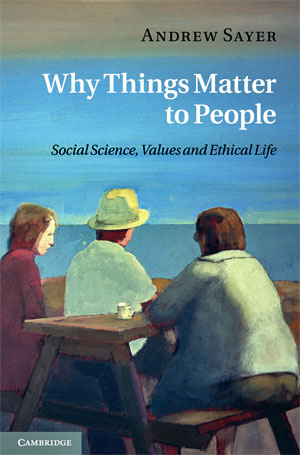
This book is intended to help social scientists make sense of the fact that our relation to the world is one of concern. The concern needn’t take the form of worry; it may be just caring about our well-being and how the people and things that matter to us are faring. It’s an evaluative relation to the world.
It’s tempting to think of people just as rational beings. But a one-sided emphasis on that special capacity fails to take us far in understanding our concerns. We are vulnerable particularly to how others treat us.
At every moment we are moving from current states of flourishing or suffering, to possible future ones—from avoiding lack or deficiency, to finding satisfaction, interest and fulfillment. Even if things are OK now, they may change in the future.
We are also deeply social beings: dependent on the care of others in early life and in illness and infirmity; only able to develop a sense of self and acquire a language and identity via others; dependent on the valuations of others to develop self-respect and esteem.
We become attached to certain people, activities and causes, so that our well-being becomes inseparable from theirs. Although those attachments may help us flourish, we become vulnerable to their loss. Hence our concerns. To flourish, we have to monitor, evaluate and look after such things.
Flourishing is not just about physical health, or avoiding violence, but being able to develop and exercise our capacities, and this depends on opportunities to develop good relations to others and to form commitments—to our families, or work, or music, or sport or religion, or whatever.
Suffering can be caused not just by physical harm, but by preventing people from pursuing their commitments—for example, stopping a religious person worshipping.
Yet modern ways of thinking encourage the common but extraordinary belief that values are beyond reason—just subjective inventions having nothing to do with evaluations of circumstances.
When a social worker claims a child is suffering from neglect or abuse, she is not merely expressing a personal “value-judgment,” but putting forward a factual claim about the child. When our doctor takes our blood pressure and gives us the numbers, we ask whether it’s good or bad; and when she tells us which, we don’t dismiss this as a gratuitous value-judgment having nothing to do with the facts of the case, but precisely a fuller account of precisely that—our state of being.
Such claims escape any dichotomy of fact and value. If you don’t know that suffering is bad, you don’t know what it is.
Why Things Matter to People follows through the implications of these qualities for the nature of values, for how we reason about what to do, for everyday morality and dignity, and for how we should study society.
My book examines the role of values, reason and ethics, and concern with dignity in everyday life. It’s about everyday morality and immorality—banal goodness as well as banal evil. While we often reason about “what to do for the best,” we often act reasonably and ethically without following any clear logical process.
Many of the ideas can be traced back to Aristotle’s virtue ethics and his concept of eudaimonea or flourishing. There are also Adam Smith’s extraordinary insights into moral emotions and responses. More recently, the feminist literature on the ethic of care demonstrates the importance of care relations in shaping who we become. Together these help us understand why things matter to us.
I came to this subject from a sense of exasperation with several disciplines—each of which, in different ways, offers alienated and alienating views of our lives.
From economics there is the rational choice—or “ratcho”—model of action. The nickname and what it rhymes with tells us what’s wrong with it. The individual is apparently born an independent adult with already-formed “preferences,” who does everything on the basis of a simplistic calculus of self-interest. There’s no sense of connectedness to significant others, need of care, or the role of emotional reason, or of being embedded in cultural traditions, of which the cult of self-interest is one. This model cannot illuminate the richness of our evaluative worlds.
Philosophy often presents an austere model of the individual reasoner—again seemingly born an adult, having no social location, culture, or significant others, and for whom emotions are a threat to rationality.
Sociology offers the “oversocialized” individual, merely a construction of all the forces impinging on her, ventriloquized by arbitrary social norms. Or else values are just subjective, not judgments about what’s objectively happening.
It’s funny how, when sociologists are harmed by anyone, they don’t say “stop that, it goes against my subjective values and the norms of our community.” Rather, like the rest of us, they say something like “don’t do that, you’re injuring or insulting me.” In ordinary as opposed to professional life, they know that such values are about something objective, something that can’t be reduced to wishful thinking: suffering and flourishing.
Just what constitutes flourishing is of course elusive, indeed contested. But while much is uncertain, we do know quite a lot. We know that children need loving care, that violence and the threat of it harms people, that stigmatization harms, that people benefit from being allowed to develop and use their capacities and participate in social life on a par with others, and so on.
Yes, different cultures provide different forms of flourishing, and different ideas about it. But those ideas are not necessarily equally good. What’s so great about the rat race, for example?
We still need to find out more about what constitutes well-being; pretending that we know nothing about it is an affectation, a form of alienation.
Why are we so worried about our dignity?
References to human dignity are enshrined in human rights declarations as the ultimate value or criterion for assessing what people are allowed to do. Apparently, nothing is more important. Oppressed people all over the world say they are struggling not just for survival but for their dignity. Elderly patients in hospital often worry more about their dignity than their illnesses. We hear people say things like “at least I was able to leave the job with my dignity intact.”
But while many appeal to dignity, hardly anyone defines it. Sometimes we talk about it as if it were a fundamental universal essence that is there, come what may. But at other times we see it as fragile and dependent on how others treat us. These seem like almost opposite meanings.
Dignity has traditionally been thought of in terms of capacities for self-command, competent performance, and emotional restraint. But there’s another side to it—vulnerability. Philosophy tends to miss this.
Philosophy values calm contemplation and the power of reason, and traditionally has a masculine aversion to acknowledging vulnerability and the fact that we all start out as tiny, dependent babies. It struggles to realize that not all forms of dependence are bad—and indeed that the acceptance of dependence and vulnerability are essential to relations of care, love and friendship.
Elderly patients are particularly vulnerable and may have lost some of their capacities; they may be incontinent and hard of hearing. What they need for their sense of dignity is a kind of care that does not ignore or take advantage of their vulnerabilities but looks after them, yet without drawing excessive attention to them so that the patient is reduced to their impairment.
It is difficult for a nurse to talk to patients who have lost most of their hearing without infantilizing them. It is difficult for caretakers to maintain their own dignity in carrying out such tasks as wiping bottoms; the patient may also be embarrassed on their behalf for this reason.
The dance of dignity in such relations is complex and subtle, though skilled caretakers may make it look effortless.
Seriousness and attentiveness on the part of the caretaker are likely to be helpful, but if overdone they may make the patient feel worse; a light touch, matter-of-factness, and humor are often helpful in restoring a sense of normality rather than crisis or deficiency. The patient also needs recognition as a particular person with a biography, attachments to others, and commitments—a need for connection as well as “respect for autonomy.” In providing these things, good care does more than secure dignity—it improves well-being.
Everyday ethical life depends not so much on following moral norms—at best these merely provide rules of thumb—but on being responsive to people’s needs in all their complexity, to what matters to people.
I hope the book shows why we need a social science that illuminates our relation to the world of concern, without belittling this as non-rational or merely a matter of subjective values, or of minor importance compared to how we actually behave.
Why Things Matter to People challenges how most social scientists think about values and objectivity. Some argue for minimizing the “intrusion” of values so as to protect objectivity. Their radical opponents say “no-one can deny their values, so no-one can be objective.”
While these two views look utterly opposed, they’re completely agreed that objectivity and values don’t mix.
But that’s precisely where they’re wrong.
Sometimes, we have to be evaluative in order to describe people’s conditions and actions adequately: the child is suffering from neglect, x’s blood pressure is dangerously high, the repeated humiliation is bad for y’s self-respect.
You could try to describe such situations with different, apparently value-free words. But then one of two things would happen: either the new words would take on the old evaluative meanings, or you would mis-describe the situation. Substitute “collateral damage” for “killing or injuring innocent non-combatants,” and either people are misled or they see through the euphemism and value it accordingly.
This means that social science often needs to provide a critical evaluation of the things it studies if it is to provide adequate descriptions and explanations. If we are given no indication of whether people’s lives are going well or not, whether they are suffering or flourishing, we have simply been given an impoverished description.
It doesn’t mean that social scientists should assert their values dogmatically; on the contrary, they need to assess them critically, in relation to what they’re about.
Values are neither “merely subjective” attitudes projected onto the world, nor are they simply arbitrary norms that we internalize; they are about something—especially, our well-being.
Values are fallible—but so are claims about things like the origin of the species or the level of unemployment. That is why we need to scrutinize them. To survive, let alone flourish, we have continually to monitor and assess how we and the things we care about are doing.
Philosophers dealing with ethics love to rush past questions of what people are like and what they need to flourish, and pose us tricky, often bizarre questions. For example: about what would be the right thing to do if we saw an out-of-control tram hurtling towards a crowd of people, and we could switch it onto another track where it would kill only one person. I suggest that it’s more useful to focus on what people are like, what they need, and on the mundane morality that we see in ordinary actions.
We need a social science that can explain why things matter to people.


Andrew Sayer is Professor of Social Theory and Political Economy in the Department of Sociology at Lancaster University. Besides Why Things Matter to People, featured on Rorotoko, he is the author of The Moral Significance of Class (Cambridge, 2005), and is now working on a book called Why We Can’t Afford the Rich: A Moral Economic Argument.